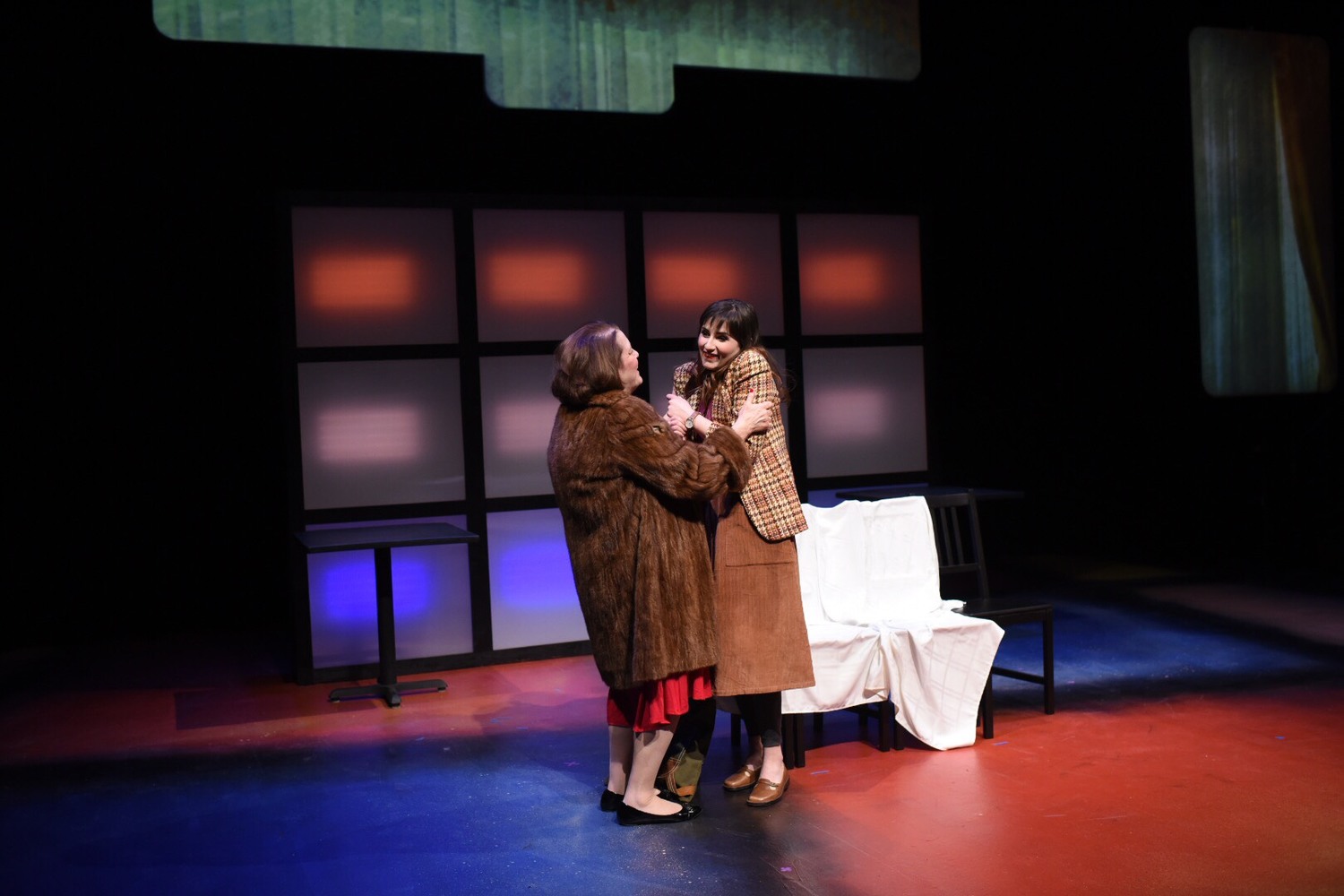Review: Lyric Arts' DEAD MAN'S CELL PHONE Carries Audiences into Technology's Future

in Dead Man's Cell Phone
Lyric Arts' latest selection, Sarah Ruhl's "Dead Man's Cell Phone," prophetically speaks to the Iphone or smart phone's debut in 2007. Steve Jobs of Apple Inc heralded the first iPhone in January, 2007, with its release to the public in June, 2007---the same year Ruhl' premiered her surrealistic play in June, 2007. With the advent of the iPhone, the first touch screens and apps that could be automatically downloaded to your phone brought innovative technology to cellular communications.
For the Lyric Arts Main Stage production, Director Scott Ford tackles this tragic-comic-fantasy to challenge foreword thinking audiences. In Ruhl's interpretation, a humble 40 something women named Jean discovers the man seated next to her fails to answer his cell phone, Jean picks up and answers the phone to silence the ring and then discovers the man, named Gordon, has died-and yet his phone keeps ringing, and he lives on for his callers.
Through a series of comic induced, intricate and sometimes absurdist happenings, Jean meets the dead man Gordon's family at the funeral. His mother, Mrs. Gottleib, the dead man's widow, Hermia, and his brother Dwight invite Jean for dinner, but only to eat a large slab of meat. Drawn into the the family drama, Jean stumbles on Gordon's career-buying and selling pieces of human commodities, which offers another twist to Ruhl's play and that potential to ponder.
On a set that features a backdrop similar to a smartphone wallpaper designed by Jim Eischen, and accompanied by original music from composer Dan Dukich, the play explores a plethora of contemporary concerns. If the subject material appears existential, the play features some comic moments, and needs to be enjoyed on multiple levels. When Jane attends Gordon's funeral, the speaker mentions that the church, along with the theatre and the restroom, remain one of the last sanctuaries free from cell phones, and then asks the audience: who answers their cell phone in the rest room?
Katie Strom Rozanas gives Jean a youthful vulnerability as she enters deeper and deeper into the Gottleib's family crisis and subsequently, Gordon's business, even meeting his mistress and contact in Switzerland. As the eccentric mother Mrs. Gottleib, Jane Burke's persona shines through the convoluted plot, and complements Kate Beahen's quirky Hermia, Gordon's widow, who suffers her own injustices.
An interesting scene, between Jane and Hermia, Roazanas and Beahen at a bar showcases the two actors immense talents for this metaphorical play. Nick Menzhuber gives Gordon a strong presence, even when placed in the afterlife, although his brother Dwight, an appropriate nerdy Phillip Hoelscher, falls in love with the mercurial Jane while bonding over luxury stationary. Brianna Bolden completes the cast as the woman who made the human organ connections with the now deceased Gordon.
More significantly, while there are several "sacred" places where cell phones barely appear, or must be placed out of sight and silenced, the phrase "no one ever walks alone," resonates in this decade more than ever. The majority of people either have a cell phone in hand, pocket or five inches from their being, and can reach someone on social media, text or by voice within seconds, truly anywhere in the world. And while Gordon's cell phone keeps his person alive, so does Facebook. How many people have difficulty removing a text or voice mail from a cell phone when a person has left their life, often permanently? Or why are Facebook pages kept alive, their walls active, long after someone has dies, and often the concern of a person's last will and testament?
One poignant scene includes Jean and Gordon navigating the afterlife listening to all the cell phone conversations-in the atmosphere-the air-a precursor to "the cloud." Whoever heard of a cloud in 2007 or imagined all the conversations, photos or stored information available in "the cloud" today? Whatever is "the cloud" now and what actually exists there? In 2007, none of this existed and Ruhl presented, if not predicted, these futuristic phenomena.
Dead Man's Cell Phone sends the audience on a fantastical journey exploring technology, past and present, and the user's relationship to these modern day devices. Are they conveniences or convenient traps, or both? How many audience members reach for their cell phones during intermission-and that was before selfies, and easy texts, emails, or downloading youtube and videos, memes..steaming television shows and films.
Ruhl's status as one of the preeminent women playwright's of the past two decades makes this play worth seeing on its own. To be drawn into these fantastical and surrealist adventures probing the audience to consider, examine the personal and world's connection to their cell phone, and other technology, and to contemplate what might arrive in the future. A future where there's photoshop, apple pay, books and newspapers, will ask these audiences to rethink the upcoming decades. Lyric Arts presents a compelling and complex Dead Man's Cell Phone that asks that whether you are present and here, or off in the afterlife, who are you without your cell phone?
Lyric Arts presents Sarah Ruhl's Dead Man's Cell Phone at the Main Stage Theater through January 27. For information on performances or tickets, please visit: www.lyricarts.org.
Comments
.png)
|
.png)
|
Videos

